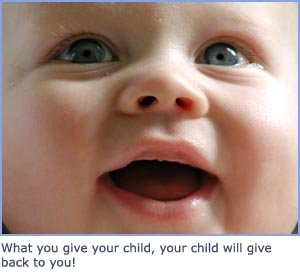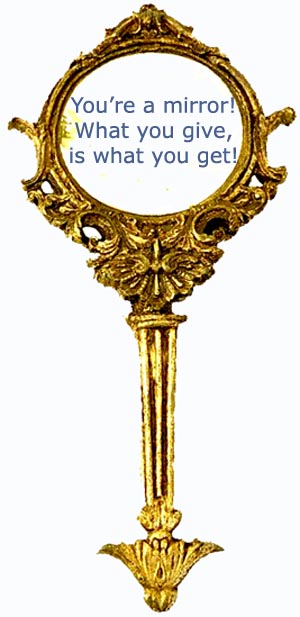Discover the Power of a Positive Attitude!
Positive Parenting’s Theoretical Big Brother, Positive Psychology
Philosophically, positive parenting is inspired by a relatively recent branch of psychology, positive psychology coined by Martin Seligman.
Positive parenting and positive psychology both share the pedagogical strategies of bringing out the best in people / children by:
- Nurturing talents and abilities that are already there.
- Building on strengths which will lead to empowering adults and building high self in esteem children.
In this way this parenting style is focused on ‘building’ and supporting in order to make kids blossom rather than repressing them in order to control them.
Mindless Obedience, No, Thank You!
Even though we abandoned the strict Victorian Age more than 100 years ago, we’re still terribly scared of ‘producing’ spoiled children.
This common fear of uncontrollable, misbehaving and spoiled children has made many parents ‘re-adopt’ old fashioned child discipline techniques to create instant obedience in their children: “You do as I say, no discussion!” or even worse, the threatening version: “You do as I say, or else …!”
The result of this authoritarian parenting style is very short term in the sense that, yes, you might get instant obedience but what about the skills that make us conscious human beings?
What about the important skills of questioning non-sensible concepts, having the opportunity to make sound choices and taking on the responsibility of living with the consequences of our choices?
These really important human skills are left very little space for growth, which is a real pity!
Positive conscious parenting on the other hand is not about exercising rigid control to get our kids to obey mindlessly.
No, in a sense the aim of this parenting style is much more long term.
Besides showing respect and empathy for ‘the little person’, the aim of conscious parenting is paving the way for happy and conscious adults.
The Mirror Effect: What You Give Is What You Get

You are a mirror!
Being aware of this insight and consciously using this knowledge in your parenting is the most effective tool you can have.
Why?
Because what you give your child (a positive attitude, a positive focus etc.) will be what your child will give back to you!
It’s really very, very simple!
Your positive attitude and unconditional acceptance will literally rub off on your child and make your child feel accepted and good about himself or herself.
The mirror effect is so strong that it’s simply impossible for your child not to be affected by it.
Therefore positive parenting does not encourage yelling, spanking, making threats, talking down to etc.
Why?
Because the mirror effect will teach your child that: “This is how I should treat other people when I’m upset or feel I can’t cope – I’ll just ‘squash’ what’s in my path and force my way through!”
No, positive conscious parenting turns the traditional parenting discipline upside down by focusing on that which we actually want our child to feel and learn: like unconditional love, acceptance, respect, understanding and so on and so forth.
Rather than punishing ‘bad’ behavior (for instance, yelling at our kid or holding back our parenting love) to force through good behavior: “You’re a bad boy for breaking your plate, go to your room until you can behave”, positive conscious parenting goes the other way around by “GIVING” your child whatever it is your child needs.
So, rather than being angry at my son for throwing his plate on the floor (even though it’s darn irritating) I would try to spot the need behind this action.
In relation to my toddler son his need would typically be choice related: e.g. he could be upset about something along the lines of: “Don’t put sauce on my pasta. I want to decide where on the plate the food should be”. Typical of my son is his need for having a degree of say in what happens to him.
So I would try to give him what he needs: respect and a certain range of choices (within an overall framework, of course.) Read about how to balance this typical parenting discipline issue of freedom vs. framework.)
Other parenting strategies are positive discipline or positive reinforcement parenting.
Expect Bad Behavior?
… Abracadabra and That’s What You’ll Get!

Also there’s another issue that has to do with your expectations:
Your child will do all in his or her power to live up to your expectations … good as well as bad.
So, if you expect your kid to ‘be bad’, your clever child will quickly decipher that and deliver that to you. It sounds strange but it’s true.
It’s the mirror effect again!
The other way around, if you expect your child to be happy and respect you, your child will do his or her very best to live up to that as well.
Benefiting from the mirror effect – giving your child the best you have to offer – to bring out the best in your kid is the real power of conscious parenting.
Please, Make a Choice of What You Want in Your Kid!
Because of the power of the mirror effect, everything starts with you, the parent.
Everything!
So, what is it YOU want? What is it you want your child to learn and feel?
The best thing you can do is to make an overall choice and try to stick to it.
When I had my son, I made the choice of always trying to fulfill my son’s needs whatever they would be: love, touch, respect, understanding, choice-making, security, comfort etc.
This was a very conscious decision!
Even though it may sound unbelievably tough on the parent, making this overall choice has made parenting really, really easy.
Why?
Because when my child does not have many unmet needs, my child does not have any reason to ‘misbehave’.
Simple!

